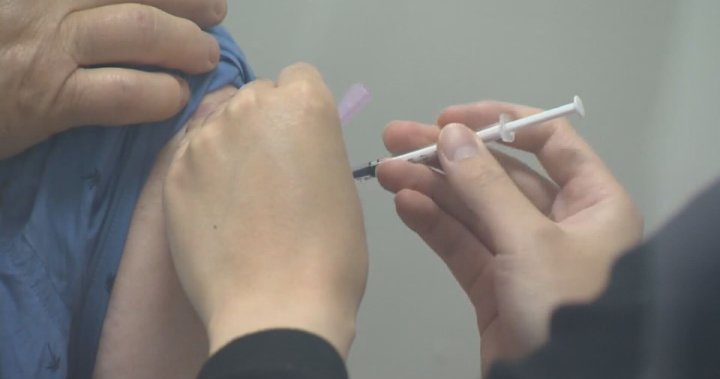Anyone in British Columbia who received two doses of AstraZeneca’s COVID-19 vaccine can now get a booster six months after their second shot, B.C.’s top doctor said Monday.
People with two doses of AstraZeneca have shown waning levels of protection from infection, although two doses of AstraZeneca still offer strong protection against severe illness, Dr. Bonnie Henry said Monday.

“This may be sooner than other healthy adults in the community where we know there’s very good, strong protection that’s lasting well,” Henry said.
Several new studies indicate that a booster may not yet be necessary for those who received either two doses of mRNA or a mix of AstraZeneca and mRNA vaccines, if those doses were administered at an interval of eight to 12 weeks.
Brian Grunau with the University of British Columbia’s Dept. of Emergency Medicine said early results from a study of paramedics across Canada show that longer vaccine dosing intervals lead to enhanced immune responses.
Read more:
The booster debate: Will you need a third COVID-19 shot?
“The interaction between vaccine dosing intervals may play a role in the timing and need for third vaccines,” he said.
“Our data suggest that the immune response is prolonged in those who have longer vaccine dosing intervals, so this may make individuals who have longer dosing intervals less required of a booster shot earlier on.”
Some other researchers aren’t convinced that booster shots are needed for everyone yet. Dr. Danuta Skowronski at the B.C. Centre for Disease Control previously told Global News the immune response from two shots administered at proper intervals is so robust that most healthy adults don’t need a booster yet.
Dr. Gaston De Serres, an epidemiologist practitioner at the Institut National de Santé Publique du Québec who has been examining Canada’s COVID-19 data, told Global News last month that he is unconvinced that the average Canadian will need a COVID-19 booster shot anytime soon.
“I think that a booster dose is needed when you see a decline in protection,” he said. “This happens with some vaccines and there is a need then to get a booster dose. But in our data at this time, we see pretty much no decline in protection.”
Read more:
COVID-19 booster shots could rake in billions for some vaccine makers
De Serres highlighted the need to focus resources on getting vaccines to the developing world.
“I think access to vaccines to developing nations is essential,” he said.
“The risk of mutations and the appearance of new dangerous variants will depend upon the number of people being infected and if there is no vaccine, obviously that’s a great opportunity for the virus to infect people and eventually acquire mutations that could be quite nasty,” he said.
“Since the beginning, we had focused on the importance of preventing hospitalizations and deaths. Well, to change that focus might be clearly something that has to be evaluated quite carefully because of this question about letting developing countries have access to the vaccines.”
Henry said the province needs to focus on boosters while also considering the bigger picture.
“We need to be able to be part of our global community and make sure people around the world are vaccinated, and we need to protect those people who need it right now,” she said.
— with files from Leslie Young & Carolyn Jarvis
View link »
© 2021 Global News, a division of Corus Entertainment Inc.














































